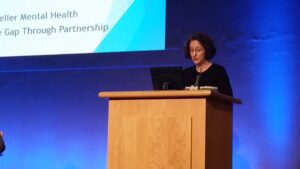Advocates, the Traveller community, policy makers and service providers took part in a national conference today to explore key steps that need to be taken to effectively address the mental health needs of the Traveller community. The conference was opened by Equality Minister, David Stanton, TD.
Traveller mental health is much lower than that of the majority population which is reflected in the fact that suicide in the Traveller community is 7 times the national average.
Speaking at the conference, organised by the Traveller Counselling Service, Pavee Point Director Martin Collins said that racism and discrimination affects how Travellers feel and impacts on Traveller mental health.

“Acknowledgement of our identity is important – especially for young Travellers’ self esteem and mental health,” he said.
“When our identity is continually being constested and devalued and Travellers are dehumanised it’s very hard for members of my community to stay healthy,” he added.
He called for a national Traveller cultural centre in order to engrain pride in the Traveller community and give visibility to Travellers’ culture and heritage in Irish society.
Dr. Geraldine Moane of UCD school of Pyschology spoke of the affects of oppression on the Traveller community. “Oppression results in low self value and negative stereoptypes that result in internalised oppression,” she said.

Travellers believe the stereotypes which results in initial anger but later becomes chronic anger and other reactions that affect mental health, she explained.
She added that 11% of Traveller deaths by suicide are due to discrimination and the social context of Travellers.
Dr. Shari McDaid, Director of Mental Health Reform also spoke at the conference and said the huge discrepancy in the mental health status of Travellers and the majority population is created the social and economic situation that Travellers are forced to live in.

She highlighted that mental health is rooted in human rights law and that Ireland is obliged to ensure mental health services are culturally appropriate and inclusive.
She said the Mental Health Commission states that service providers need to respond sensitively to the needs and culture of service users.
She pointed out that discrimination exists within health services, that there is a lack of trust by Travellers in health service professionals and that if Travellers are not dealing with a GP they loose out on an important pathway into specialist mental health.
“In this type of situation how to Travellers get the support they need, ” she asked.
Other barriers include cost, lack of information, lack of information about services, language and communication issues with GPs and most importantly a lack of understanding among health care professionals of the social and cultural context of Travellers.

She said we need designed culturally appropriate recommendations for mental health services and a dedicated policy on cultural competency.
“We need a dedicatd mental health programme and implementation plan with the Health Service Executive,” she said. She also called for community outreach programmes to help reduce the stigma around mental health in the Traveller community and further research on Traveller mental health needs.
Thomas McCann of the Traveller Counselling Service called for the development of mental health partnerships and an ethnic identifier to be introduced across the system to help address the specific needs of Travellers.
“We also need to empower and support local Traveller groups to address mental health concerns,” said Mr. McCann.

Equality Minister, David Stanton TD, who also spoke at the conference acknowledged the need to work in partnership with Traveller organisations.

